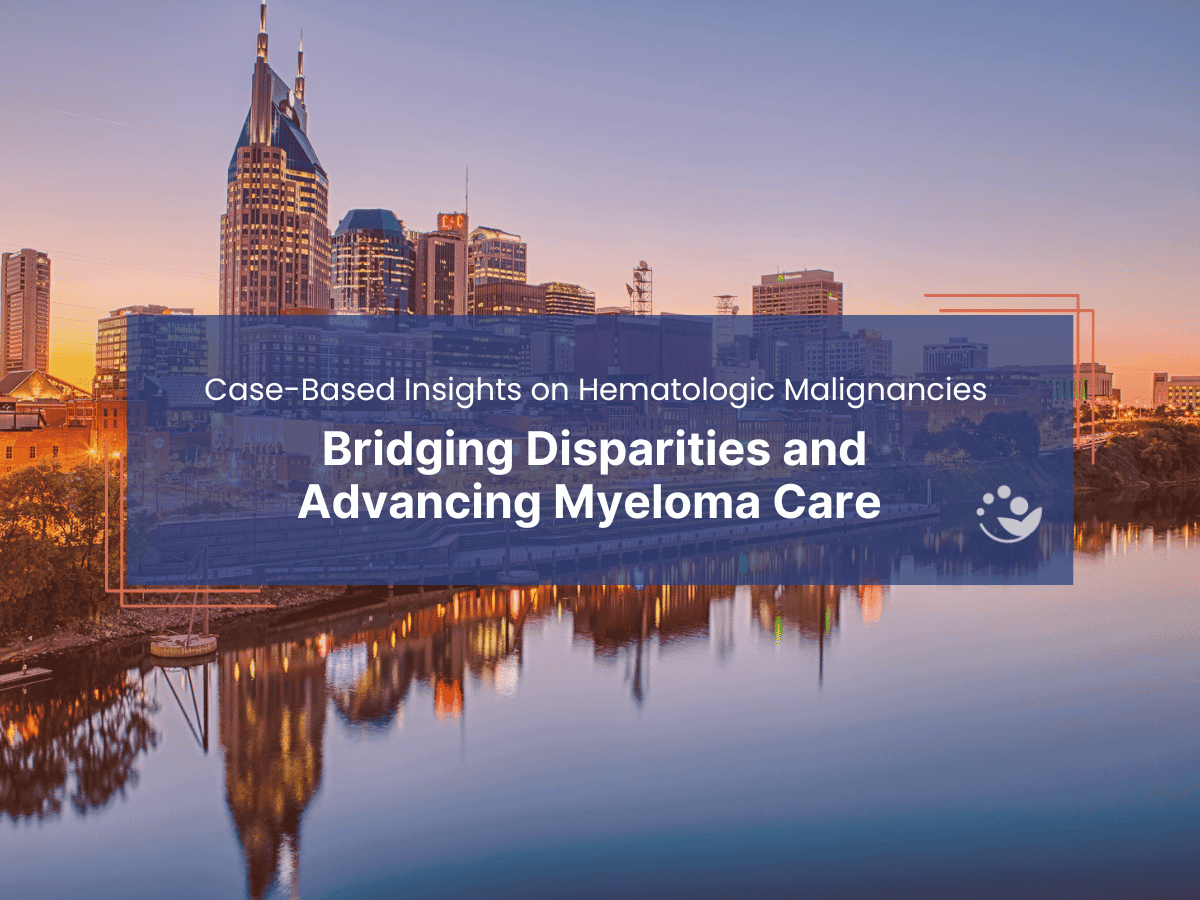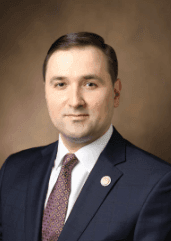Bridging Disparities and Advancing Myeloma Care: Case-Based Insights on Hematologic Malignancies

Author
Binaytara Team
Introduction
On May 3, 2025, Dr. Muhamed Baljevic will chair the Case-Based Insights on Hematologic Malignancies conference in Nashville, Tennessee. his interview offered in-depth insights into Dr. Baljevic’s extensive experience in treating hematologic malignancies, including disparities in cancer care and the promises of innovative therapies like CAR T-cell and bispecific antibody treatments.
Highlights of the Interview
Advancing Myeloma and Lymphoma Treatments
Dr. Baljevic emphasizes the importance of case-based discussions in the sessions, aimed at enhancing learning and improving patient outcomes. The inclusion of sessions on cutting-edge therapies illustrates how the conference will address emerging treatment paradigms in hematologic cancers, ensuring that clinicians stay ahead of the curve in an ever-evolving field.
Innovative Myeloma Therapies: CAR-T and BiTEs Leading the Charge
One of the key themes of the conference is the transformative impact of CAR-T and BiTE therapies in the treatment of myeloma. Dr. Baljevic highlights ongoing challenges, such as access to these therapies and the need for optimization to ensure better patient outcomes.
Overcoming Cancer Disparities: Addressing Gaps in Treatment Access
The interview points out the importance of equitable representation in trials, especially in regions like the Delta regional Authority of the US, where cancer survival rates are disproportionately low. Dr. Baljevic speaks on Vanderbilt’s role in a major Leukemia & Lymphoma Society (LLS) grant that seeks to open access to innovative therapies in these regions, underlining the conference's broader mission to address cancer care equity on a global scale.
Interview
We met with Dr. Baljevic to discuss the goals of the upcoming conference in Nashville, emerging hematological cancer treatments, and how to bridge the gap in cancer care for better patient outcomes.
Question | Binaytara: Can you tell us about the conference you are chairing?
Answer | Dr. Baljevic: “I am really excited about the regional symposium we are organizing with Dr. Shah and the entire team. The goal is to improve the awareness and education of providers while supporting the incredible work Binaytara is doing in Nepal. It is a rewarding and important initiative. We will be focusing on plasma cell, B-cell, and myeloid malignancies, as well as transplantation and cellular therapy topics. These are incredibly helpful and really valuable educational opportunities for anybody engaged, particularly those who will hopefully come, witness, ask questions, and benefit from hearing expert speakers on these topics. But also, this is a way to support this incredible mission that Binaytara is pursuing. So that is really, to be honest with you, maybe even a main goal for me. And then, of course, educational support for the greater community of Tennessee at large, which is always important.”
Q: What are some of the key themes and topics that will be covered at this conference?
A: “The conference will consist of four distinct sessions: multiple myeloma, lymphoma, myeloid disorders (including acute leukemia, myeloproliferative neoplasms, dysplastic syndromes, and clonal hematopoiesis of indeterminate potential or CHIP), and special issues in cellular therapy and T-cell redirecting therapies. The fourth session will address transplantation, CAR T-cell therapy, and bispecific antibody therapy, focusing on outpatient delivery and access disparities between academic institutions and community hospitals or private practices. The symposium's key feature is its emphasis on case-based discussions, which will occupy three-quarters of the time. Expert speakers will present practical, real-world cases to illustrate relevant data for decision-making processes. This approach aims to enhance the impact and retention of shared knowledge and experience for participants.”
Q: You have multiple areas of investigative focus in multiple myeloma. Can you give us an overview of what attendees can expect from your talk in Session One, titled "When to CAR-T and When to BiTE"?
A: “Yes! We wanted to have that title capture attention because these are both T-cell redirecting therapies, but they differ significantly. CAR-T cell therapy, currently available as autologous CAR-T products, requires collecting a patient’s T cells, engineering them, and reinfusing them after several weeks. It is similar to an autologous stem cell transplant, requiring chemotherapy beforehand to make space for the new cells.
In contrast, T-cell redirecting bispecific antibodies (BiTEs) are off-the-shelf protein molecules that simultaneously bind tumor cells and T cells, facilitating immune-mediated tumor killing.
A key discussion in the field is how to best use and sequence these powerful therapies in B and plasma cell malignancies. CAR-T is often considered a "one-and-done" approach, offering a break from continuous treatment, but it comes with risks like immune reactions, neurological toxicities, and infections. Early use has shown better outcomes, but cost, toxicity, and equitable access remain a challenge.
Throughout the symposium, we’ll explore these issues, including how to optimize sequencing, improve access, and integrate these treatments across hematologic cancers.”
Q: How does a delayed diagnosis impact multiple myeloma patients?
A: “Any delay in cancer diagnosis can negatively impact patients, but in multiple myeloma, the challenge is even greater because there are no approved screening tests. Unlike other cancers, routine checkups do not include the specialized tests needed for diagnosis. Symptoms like fatigue, bone pain, or infections are common in many conditions, leading to misdiagnosis or late detection.
This delay can be costly—myeloma damages organs, weakens the immune system, and increases the risk of life-threatening infections and blood clots. Early detection is crucial, especially in precancerous stages like smoldering myeloma. We have worked hard on testing various treatments, like Daratumumab, which has just recently shown survival benefits and is under review for approval in high-risk smoldering myeloma. If approved, it would be the first drug labeled for this high-risk precancerous stage of myeloma. Raising awareness among physicians is key to catching the disease earlier and improving outcomes.”
Q: Dr. Baljevic, could you tell us more about your connection to the work of Binaytara?
A: “The work that Binaytara is doing is incredibly humanistic, which is why I feel so attached to it. The foundation is helping some of the most impoverished regions of Nepal, where a new facility is being planned and built, one that needs a lot of support. I come from Bosnia, a country that was deeply affected by war. So my life began in a way that is very different from where I am now. While my experience does not compare directly to the areas Binaytara serves, the core principles remain the same. There are human struggles that unite us, regardless of where we are.”
Q: You mentioned disparities in myeloma care. Could you elaborate on how these disparities manifest, particularly in the underserved areas?
A: “Yes, disparities in myeloma care are significant, especially in regions like the Delta regional Authority established by Congress in 2000 to make strategic investments of federal appropriations into the physical and human infrastructure of impacted regions. The research shows that cancer patients in this and the surrounding region often experience worse survival rates. We’ve also seen that historically, underserved populations—such as African American patients—have been underrepresented in clinical trials. Without adequate representation in clinical trials, we cannot extrapolate the data objectively to those populations. What is particularly important is that there is growing evidence that when these underserved populations have equitable access to care, they actually experience better outcomes than their Caucasian counterparts. It is encouraging that the underserved population representations in the latest multiple myeloma trials have improved significantly.”
Q: You are also involved in an important grant program aimed at addressing these disparities. Could you tell us more about it?
A: “Yes, in collaboration with other academic institutions across the country, we are participating in a significant LLS grant, aimed at bridging gaps in access to care in underserved populations. The goal of this program is to ensure that patients in these regions have adequate access to innovative clinical trials and therapies for hematologic malignancies, including myeloma. As the myeloma program lead, I am curating the educational component of the grant at our institution. We organize routine lectures from both Vanderbilt and community speakers, discussing scientific and medical care topics and exploring ways to make sure all patients, especially those from underserved areas, have an equal chance to access the latest treatments.
Q: How are you ensuring equitable access to clinical trials for these patients?
A: “One of our main focuses is to break down the barriers to clinical trial access for underserved populations. By educating healthcare providers, improving awareness, and working with institutions nationwide, we can help ensure that these patients have the same access to novel therapies as those in more well-served regions. We believe that expanding access to cutting-edge treatments will improve outcomes for these patients.”
Register here to join us in Nashville, Tennessee, on May 3rd, 2025, and be part of the conversation on revolutionizing patient care and expanding access to innovative therapies for underserved communities. To follow conversations online, use the hashtag #HemeNash25.

Dr. Muhamed Baljevic
About Dr. Baljevic
Dr. Muhamed Baljevic is an esteemed medical oncologist and researcher, specializing in the treatment of hematologic malignancies, including plasma cell malignancies and disorders. He currently serves as the Director of Plasma Cell Disorders Research and the Director of Vanderbilt Amyloidosis Multidisciplinary Program (VAMP). He is also the disease team clinical research lead for plasma cell dyscrasias and lymphomas, where he plays a key role in advancing the understanding and treatment of these conditions. Dr. Baljevic also co-chairs the Vanderbilt-Ingram Cancer Center scientific review committee and monitoring system.
Originally from Bosnia, Dr. Baljevic graduated with honors in research from Cornell University in 2010. His educational journey led him to Qatar, where he completed his high school studies under the British A-level system and went on to join the Cornell Medical School branch in Qatar, one of the institution’s early cohorts. He completed his accelerated pre-medical and medical school training there before pursuing internship and residency training at the New York Presbyterian’s Cornell program in New York. Dr. Baljevic completed his hematology and medical oncology training at MD Anderson Cancer Center and graduated in 2016, after which he entered independent practice.
Dr. Baljevic’s career includes a transformative period at the University of Nebraska Medical Center (UNMC), where he served for five years. There, he led several pioneering efforts, including the development of the first investigator-initiated clinical trials in myeloma and transplant for myeloma, as well as delivering the first CAR T-cell therapy to a multiple myeloma patient in the state. He also performed the first bloodless stem cell transplant in the state and region for a myeloma patient.
In 2021, Dr. Baljevic was recruited to Vanderbilt University Medical Center, where he leads the multiple myeloma and multidisciplinary amyloidosis programs. His research and clinical focus continue to center on plasma cell disorders, advancing immune therapy treatment strategies, and improving patient outcomes.